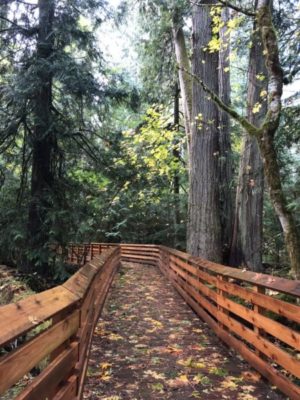Image credit: Cathedral Grove, MacMillan Provincial Park, BC – Photographer, Sheila Gauthier
When I say the words “learning opportunity”, what’s the first thing that comes to mind? Is it a workshop or a course? Do you picture yourself in a physical or virtual training room, attending an event of some kind?
Naturally I’m a fan of workshops and courses as I design them all the time for my clients. Courses can serve people very well if designed effectively. But going to a course often takes a person out of their work environment, and they bump up more often against constraints of time and space. We need to add in broader ways to learn – every day and in many ways.
One idea might be to think about how we show up in our work, especially in our interactions with others. What if we got a little creative and thought of ourselves as taking on different learning-related roles, ones that we could draw on at any time? Here are some possibilities:
- The Discoverer finds new resources to support the group’s work
- The Experimenter encourages risk-taking and trying new things
- The Connector brings people together and encourages the building of community
- The Observer watches for patterns and gaps, alerting people to challenges and successes in the environment
- The Weaver combines and shares ideas across different projects/teams/departments, spreading innovation
- The Storyteller tells stories to foster understanding and help the group see things from other perspectives
- The Summarizer distills concepts or conversations into clear, useable pieces
- The Celebrator recognizes and celebrates people’s diverse lived experiences, as well as individual and group achievements
No doubt we could think of other roles to help us create more opportunities to learn, but these might be somewhere to begin.
Looking at these roles another way, we see that these are all facilitation skills that can be learned and practiced. Yet these skills can be practiced every day by anyone – not just someone who is responsible for the training program or who calls themselves an instructor or facilitator.
All of us can take steps to facilitate our own and others’ learning, and we can take them in the simplest of ways. Maybe we ask a colleague a good open-ended question, introduce two people working on related projects who don’t know each other yet, or alert a group that someone’s viewpoint isn’t being included. Or perhaps we explain a tricky concept by sharing a metaphor, inspire colleagues to try something new, or pass around an article that might help. We don’t have to call ourselves the name of the role, but simply practice the skills the role embodies.
The opportunity to learn is all around us. Which ways will you create today?
Beth Cougler Blom is a learning designer and facilitator who works with clients across all sectors to help them create great learning experiences. She is the author of Design to Engage: How to Create and Facilitate a Great Learning Experience For Any Group, and the host of Facilitating on Purpose, a new podcast about designing and facilitating learning. Learn more about Beth at bethcouglerblom.com.
There you have it. What learning-related roles will you discover today?
And, on another note, in the work that I do, I’ve come across or created a variety of resources my clients find helpful. I like to share all that I can and now have taken this a step further. I have created a Resources page on my website. It is a work in progress and I will add more as I go. Feel free to take a peek to see what’s available. All are free to download.
Until next time,
Frank



